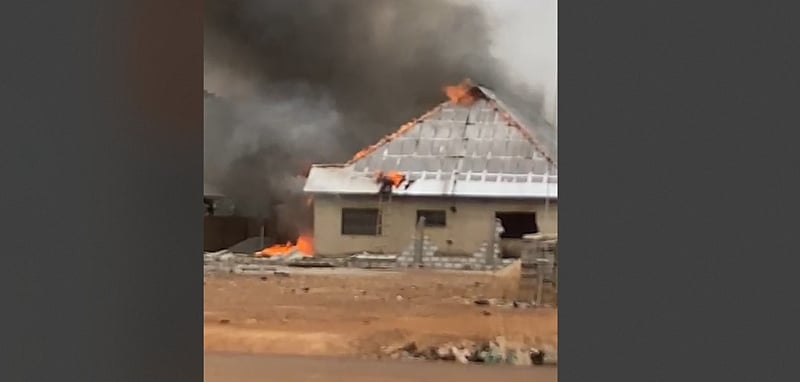The normally serene town of Bawku in Ghana erupted into violence on a Wednesday morning, sparked by a clash between two rival factions, the Kusasis and the Mamprusis, and compounded by a fatal police intervention. The incident, rooted in long-standing ethnic tensions and disputes over land and resources, quickly escalated into a riot, leaving a trail of destruction and fear in its wake. The immediate trigger for the unrest was an attempt by the Kusasi faction to block the Mamprusi community from accessing their designated market center. This action, seemingly motivated by deep-seated animosity and a desire to exert control over economic activity, further inflamed the existing tensions between the two groups.
The arrival of the police, intended to diffuse the volatile situation, tragically backfired. In their attempt to disperse the agitated Kusasi youth, police officers opened fire, resulting in the death of one civilian and injuries to two others. This use of lethal force, whether justified or not under the circumstances, proved to be the catalyst that ignited the simmering resentment into a full-blown conflagration. The already aggrieved Kusasi youth, now further enraged by the death and injuries inflicted by the police, channeled their fury into acts of retribution.
Their anger quickly found a target: the Bawku Divisional Police Commander, Adamu Seidu. Viewing him as a symbol of the perceived injustice and excessive force employed by the police, the youth descended upon his private residence located in Manga, a nearby community. The house was set ablaze, consumed by the flames of their collective rage. Not content with this act of destruction, the mob continued their rampage, targeting a police vehicle parked within the Bawku township. The vehicle, too, was set on fire, a stark testament to the breakdown of law and order and the depth of the community’s anger.
The immediate aftermath of the violence was characterized by widespread panic and fear. The sounds of gunfire and the sight of burning buildings sent residents scrambling for safety. Homes were transformed into temporary shelters as families sought refuge from the escalating violence. The once bustling streets of Bawku became eerily deserted, replaced by the unsettling quiet of a town under siege. The incident served as a grim reminder of the fragility of peace in the region and the potential for even minor disputes to escalate into widespread chaos.
The underlying causes of the Bawku conflict are complex and deeply rooted in the region’s history. Decades-old disputes over land ownership, chieftaincy succession, and access to resources have fueled a cycle of violence and mistrust between the Kusasi and Mamprusi communities. These historical grievances have created a volatile environment where even seemingly minor incidents can quickly ignite into major confrontations. Adding to the complexity is the influx of small arms and light weapons into the region, which has exacerbated the violence and made it more deadly. The proliferation of these weapons has empowered local militias and made it easier for individuals to resort to violence to settle scores.
The incident underscores the urgent need for a multi-faceted approach to address the root causes of the conflict and prevent future outbreaks of violence. This includes strengthening local conflict resolution mechanisms, promoting inter-communal dialogue and reconciliation, and addressing the underlying issues of land ownership and resource allocation. Furthermore, there is a need for comprehensive security sector reform to improve the capacity of the police and other security agencies to manage conflict effectively and impartially. This involves providing adequate training in conflict resolution, human rights, and community policing, as well as ensuring accountability for human rights violations. Finally, addressing the proliferation of small arms and light weapons is crucial to reducing the lethality of the conflict. This requires regional cooperation to control the flow of weapons across borders and to disarm local militias. Ultimately, lasting peace in Bawku will require a concerted effort by all stakeholders, including government, traditional leaders, civil society organizations, and the communities themselves, to address the underlying causes of the conflict and build a foundation for sustainable peace.














